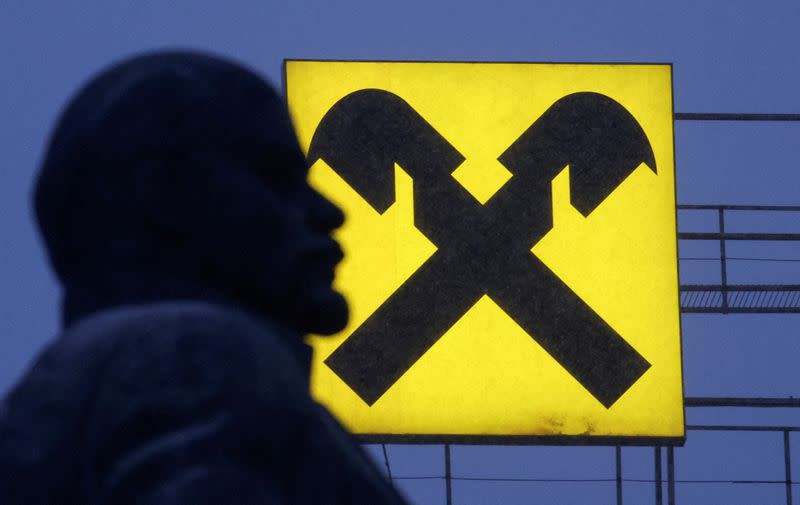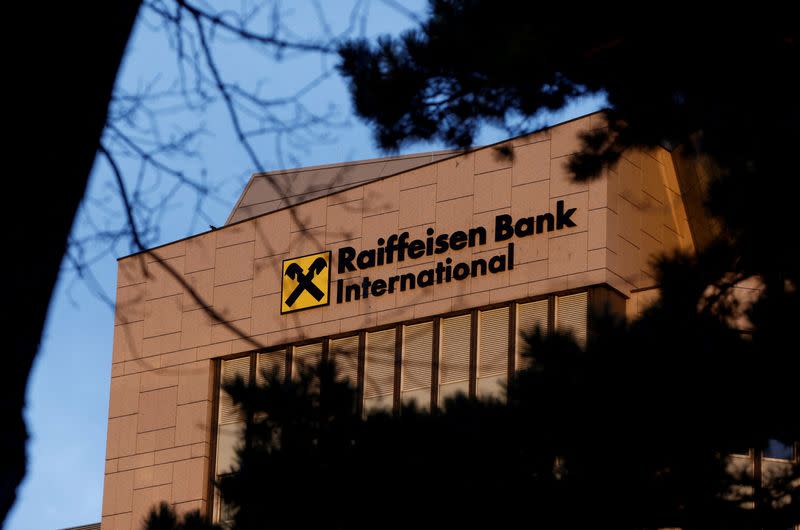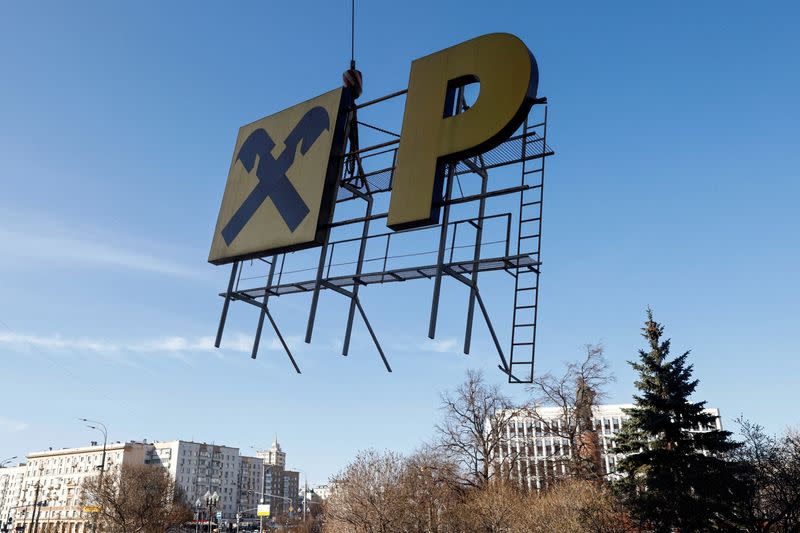VIENNA (Reuters) -For more than four months, U.S. envoys delivered increasingly shrill warnings to Austria's Raiffeisen Bank International to scrap a deal they said had links to one of Russia's most powerful oligarchs. In May, Washington's patience snapped.
In a written ultimatum that landed on May 8 at the bank, its supervisor the European Central Bank and Austria's government, Washington threatened to curb Raiffeisen's access to the dollar, according to one person who has seen the letter, a potential death sentence for the biggest Western lender in Russia.
Within hours, Raiffeisen had called off the deal first announced in December, but the damage was done: by pushing Washington to the brink, the seeds of mistrust had been sown, said one person with knowledge of U.S. thinking.
Now, nearly two months on, pressure on the bank to loosen its ties with Russia is mounting, from both Washington and the ECB, three people with knowledge of the process said.
Raiffeisen, and Austria, are on the front line of a global push by the United States to isolate Russia by reinforcing sanctions on banking and choking off access to Western goods more than two years after it invaded Ukraine.
Reuters has spoken to more than a dozen people, including senior officials involved in discussions with the United States, Austria and European regulators, as well as sources with direct knowledge of the bank's strategy.
The interviews show it remains under immediate international pressure to retreat from Russia - despite ending its deal to buy a stake in Austrian construction firm Strabag, which the U.S. Treasury said in May belonged to sanctioned Russian businessman Oleg Deripaska.
Deripaska has told Reuters the U.S. response to the deal was "balderdash" and a spokesperson for the businessman reiterated that "Deripaska had zero interest in Strabag at this moment".
The interviews also show that Raiffeisen failed to take heed of warnings well over a year ago from European regulators that it was a playing a high-risk game with Washington over its business in Russia.
Washington's threat to penalise Raiffeisen has not been withdrawn and it continues to closely monitor the bank, its relations with Russia and any potential sanctions violations, two of the people with knowledge of the process said.
If Raiffeisen was prepared to do a deal that Washington has linked to Deripaska, who is accused by the United States of being part of a Kremlin-backed campaign to meddle in its 2016 presidential election, it could take other risks, said the person familiar with U.S. thinking.
A Raiffeisen spokesperson said exchanges with the U.S. Treasury regarding Russia were "generally friendly" and that it was continuously reducing its exposure in the country.
The U.S. Treasury declined to comment for this story.
Washington has the power to fine banks in breach of sanctions, or cut them off from the dollar. It hit French bank BNP Paribas, for instance, with a $9 billion penalty in 2014 for violating U.S. sanctions on Sudan, Iran and Cuba.
"Raiffeisen, and Austria, are playing with fire," said Nina Tomaselli, an Austrian lawmaker from the Greens, which are part of the country's ruling coalition. "Whether we like it or not, America has got the whip hand."
'FLYING BLIND'
While many Western governments have shunned Russia, some Austrian politicians have been reluctant to sever ties with a country still thanked for allowing Austria's rehabilitation in 1955 following World War Two. In return, Austria commited to remain neutral.
Austria still relies heavily on Russian gas, while Vienna has acted as a hub for cash from Russia and its ex-Soviet neighbours through a financial network built after the fall of communism.
But Raiffeisen's European supervisors want immediate action. ECB officials attended a meeting of the bank's supervisory board in June to urge the lender to act quickly and the regulator has demanded it outline in the coming weeks what steps it will take, one of the people with knowledge of the process said.
A senior international regulator said the aborted Strabag deal had exacerbated relations with the bank's ECB supervisors and that they viewed Raiffeisen as dishonest. The regulators also worry they are "flying blind", knowing too little about Raiffeisen's Russian operations, a second person said.
Raiffeisen said the bank had cut the volume of loans and payments in Russia and was taking steps to reduce deposits, of which it has 14 billion euros ($15 billion) there.
The ECB declined to comment for this story.
With sprawling industrial holdings, more than 18 million customers from Vienna to Moscow and 44,000 staff, Raiffeisen is a financial linchpin for Austria and much of eastern Europe.
Russia has become an even bigger money spinner for the bank since the Ukraine war started in 2022 - making up about half of the group's profits in the first three months of this year - as fees on payments abroad spiked.
Nevertheless, the U.S. Treasury's threat to pull the rug out from under Raiffeisen continues to resonate deeply with its management, a person with knowledge of the bank's thinking said, adding that such a step would be "fatal", in part because big corporates who use it for international payments would leave.
The U.S. authorities are aware of the seismic fallout such a move would have on Raiffeisen, as well as the potential it could spill over into the wider financial system, and are treading carefully, one of the people with knowledge of U.S. thinking said.
PREPARING FOR THE WORST
That's why Washington would prefer European regulators to force the bank to loosen its ties with Russia, the two people with direct knowledge of the process said.
But Europe's efforts to rein in Raiffeisen as part of measures to choke Russia's economy following Moscow's invasion Ukraine have been chequered.
In the first few months of 2023, the ECB and European regulators at the Single Resolution Board, an authority that winds down banks in trouble, discussed various scenarios should Raiffeisen run into difficulties, two people with knowledge of those talks said.
The talks, which have not been previously reported, prompted a conversation between the officials and Raiffeisen about preparing a plan to deal with an existential crisis that could be triggered by a U.S. penalty.
The U.S. Treasury's sanctions enforcer, the Office of Foreign Assets Control (OFAC), had opened an investigation into Raiffeisen's Russian activities in early 2023.
One of those sources said regulators examined a potential break-up of the bank but in talks with Raiffeisen, it was reluctant to prepare a plan for a contained winding up in an emergency - and won the support of Austrian officials who feared any such discussion could trigger panic were it to leak.
The discussions were abandoned in March 2023, when two U.S. banks and Credit Suisse collapsed, distracting the attention of regulators, the person said.
Raiffeisen said it terminated the Strabag deal when the regulatory conditions were not met, that no money changed hands and it does not consider its access to the U.S. financial system at risk.
The Single Resolution Board and Austria's finance ministry declined to comment on the 2023 discussions.
'LOOKING FOR LOOPHOLES'
While European Union countries forge joint sanctions on Russia together, it is left to countries to enforce them. In Austria, various ministries and authorities are responsible for monitoring and enforcing sanctions.
Austrian officials in various arms of government advised Raiffeisen privately against the Strabag deal but it pressed on anyway, three people familiar with the matter said.
Speaking up to Raiffeisen, which is part of a powerful group rooted in Alpine farming and has wide political clout, is difficult in Austria, said one public official.
Austria's central bank, which has the power to freeze assets, said it was up to banks themselves to ensure deals did not break sanctions.
"We have a lot of legislation but enforcement is extremely weak. If countries have an economic interest, that often prevails," said Sophia in't Veld, a European Union lawmaker who helped pass sanctions rules.
To be sure, Russia has made it clear it wants Western banks such Raiffeisen to stay, which could make it hard for them to get permission to leave - and get their money out.
Italian bank UniCredit, also present in Russia albeit on a smaller scale than Raiffeisen, has challenged the ECB legally over the central bank's push to get it to leave Russia.
Raiffeisen has about 5 billion euros of capital trapped in Russia, according to one of the sources, and the Strabag deal was designed to free up $1.5 billion of that.
The bank has repeatedly said it intends to get out of Russia, but can't say when that might happen.
"Instead of pulling back from Russia, Raiffeisen has spent more than two years looking for loopholes and gaps to get its money out," said Austrian lawmaker Tomaselli.
($1 = 0.9295 euros)
(Additional reporting by Alexandra Schwarz-Goerlich in Vienna, Francesco Canepa in Frankfurt, Karen Freifeld in New York and Stefania Spezzati in London; Editing by Elisa Martinuzzi and David Clarke)



